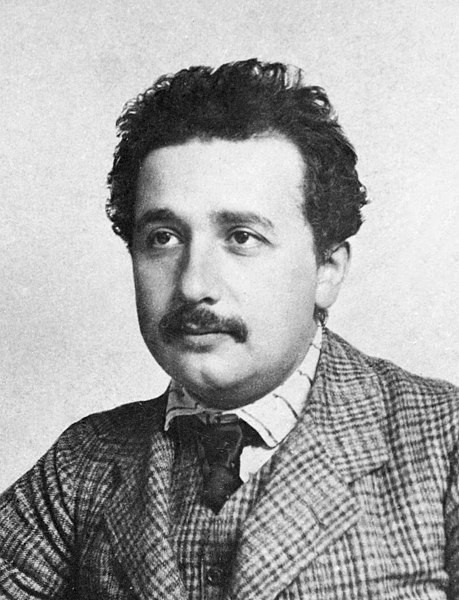
Albert Einstein (credit: Lucien Chavan, via Wikimedia Commons)
It is important to reiterate here that quantum theory
is not talking just about the uncertainty of events at the sub-atomic level. Quantum
theory says that the processes taking place at the subatomic level are always occurring
in ways that appear to us to be uncaused—what
Einstein called “spooky action at a distance” (he hated the very idea of it). But
that is not its big point.
What really matters is that it also opens up the
possibility that all events – both sub-atomic and macro – are not inescapably determined
by other earlier events. All events are always only more or less probable and
their probabilities may be influenced by actions done by living things.
This is the view that is consistent with ordinary
life. Why do I feel free to shape at least some of the events in my own life? Simply
because I really do have that capacity. I am, to a moderate degree, free. My
belief that I am free is not some pathetic, unscientific delusion. I can’t stop
a solar eclipse; I can duck under a low beam.
Physicists are unclear about how or even whether
quantum uncertainty and non-quantum uncertainty enhance each other. The range
of outcomes in complex systems may be influenced by both quantum and non-quantum
forces. Currently, we just don’t know. The exact nature of what is going on
down there is still being debated.
However, our moral models in the rest of this book are
not affected by these distinctions. In the level of reality at which our
choices are made and our actions are done, we experience reality as being made
of probabilities in which wise, thoughtful human actions can intervene and
alter the likelihoods of at least some outcomes. This is all that really
matters for Moral Philosophy. Freedom and responsibility are real.
Therefore, in all that follows, I will speak of the
probabilistic quality of reality as being one of the crucial and basic facts that
we humans must deal with. When I speak of uncertainty, I will be referring to
the uncertainty of all of reality, quantum and non-quantum.
And on the
subject of human freedom, simply put, none of us would engage in everyday life
if we did not see ourselves as being free. In my dealings in everyday life, of
course I believe in free will. I get out of the way of oncoming buses. I go to
work to earn my pay. I hold people responsible for their actions. I expect
other rational adults to do the same. I applaud/reward decent actions and
reprimand/punish mean, immoral ones.
I calculate odds
of both the material rightness and the moral rightness of nearly everything I
do. The Bayesian view of the mind, combined with the quantum picture of
reality, affirms my everyday picture of myself. Free. Responsible. Scared.
The Bayesian
model of the human mind fits the quantum model of the universe because
Bayesianism lets us see the human mind as an adaptation to universal
uncertainty. A living thing which has a sense-data-processing,
probability-calculating, action-planning operating program “factory-installed”
(at birth), one that is also easy to update for years after manufacture, is
going to be more likely to survive in a probabilistic world than is any other kind of living thing we
could propose. You contain some proven, durable technology.
The point of
this chapter then is this: the Bayesian model of the human mind fits with the
sociocultural model of human evolution and the quantum model of reality. Bayesianism,
cultural evolution, and quantum uncertainty can be integrated into a single
view of what we are and what we should be doing. We are thinking creatures learning, over generations and as individuals, to constantly improve how we deal
with our scary surroundings. Why? Because we want to live. In the end, that is what Moral Philosophy is about.
With this
tripartite model to support us, we are now ready to draw some powerful
conclusions.
Notes
1. C.S. Lewis, Mere
Christianity (New York, NY: HarperOne, 1952), p. 19 of URL link. https://www.dacc.edu/assets/pdfs/PCM/merechristianitylewis.pdf.
2. Vassilios Karakostas, “Nonseparability,
Potentiality and the Context-Dependence of Quantum Objects,” Journal for General Philosophy of Science,
Vol. 38 (2007), pp. 279–297. http://arxiv.org/ftp/arxiv/papers/0811/0811.3696.pdf.
3. Robert Bishop, “Chaos,” Edward N. Zalta, ed., Stanford Encyclopedia
of Philosophy (Fall 2009 edition,
first published July 2008). http://plato.stanford.edu/archives/fall2009/entries/chaos/.
4. “Indeterminism,” Wikipedia, the Free Encyclopedia.
Accessed April 25, 2015. http://en.wikipedia.org/wiki/Indeterminism#Robert_Kane.
No comments:
Post a Comment
What are your thoughts now? Comment and I will reply. I promise.